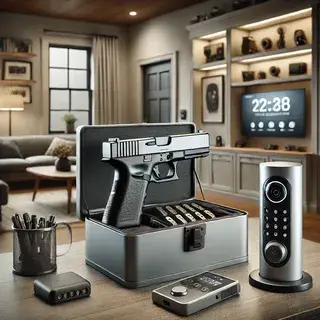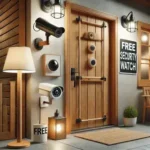Picture it like this: a calm, serene evening at home is suddenly shattered by the smashing of glass. The sound of footsteps creeping through the house makes your heart race. Suddenly you realize that your family may not be properly served by just having cameras or alarms for security.
What if you could immediately defend yourself and your loved ones in the most critical moment? This is where a home security gun comes in.
More than just a piece of gear, a home security gun serves as your backup defense if all other options have been exhausted. In the face of peril, it offers a feeling of assurance and control. Only a firearm can instantaneously neutralize a threat, allowing you time to react and safeguard what is most important, even though cameras, locks, and alarm systems can warn you of one.
This guide to the home security gun, tells in detail all that one needs to know-from the firearm to the legal consideration and proper training. This Bible of home security will cater to the erstwhile owners of licensed guns who are looking for advice and insights about the weapon as they delve into its use in the home. This is for someone who wants to own a gun for the first time for protection at home.
Let’s dive into why a home security gun might be the best investment you can make for your safety and peace of mind.
Section 1: Understanding Home Security Guns
What is a Home Security Gun?
A home defense weapon refers to any gun for keeping your house and family safe from various threats. Choosing a gun depends on many things like how experienced in handling this type of weapon you are, the surrounding environment, or personal preferences. It may include handguns, shotguns, or even rifles, each having its advantages and some disadvantages.
- Handguns: Frequently chosen for home defense, handguns are small, convenient to keep, and rapid to fire. They are adaptable and enable fast, accurate shoots, particularly in confined spaces.
- Shotguns: Shotguns are a common option because of their spread and stopping power, which make them quite useful at close range. The probability of striking your target under pressure is increased by the broad shot pattern.
- Rifles: Despite being less popular for home defense, rifles are more powerful and accurate. They might not be as useful in confined spaces, though, and in places with a high population density, there is a chance of over-penetration.
Section 2: Why Consider a Home Security Gun?
1. Increased Protection
Having a home security gun can greatly improve your odds of protecting your family and yourself in an emergency. Having a gun on hand offers you a tactical edge and protects you both physically and mentally if someone breaks into your house.
2. Control and Self-Defense
A firearm allows you to take control of a situation, especially if you’re faced with an armed intruder or a dangerous criminal. Non-lethal options, like pepper spray or a taser, may not be as effective in certain situations, especially if the attacker is armed or under the influence.
3. Peace of Mind
Having a home security gun gives you peace of mind since you know you’re ready for anything. A gun is the final resort in a life-threatening scenario, even if it’s crucial to have several layers of security (such as locks and cameras).
Section 3: How to Choose the Right Home Security Gun
Factors to Consider When Selecting a Home Security Gun
Selecting the best home security gun necessitates great deliberation. Your choice may be influenced by several elements, including the type of gun, handling, safety features, and even local regulations. Below is a summary of the most crucial factors to take into account:
1. Gun Type: Handgun, Shotgun, or Rifle?
- Handguns: A handgun is a great option if you’re searching for a weapon that’s convenient to handle and keep indoors. It is quick to deploy, small, and concealable. Models like the Smith & Wesson M&P Shield and Glock 19 are among the most widely used pistols for home defense.
- Shotguns: A shotgun works very well if stopping force is your top concern. Since the shot’s dispersion enhances the likelihood of striking your target, a shotgun eliminates the requirement for precise accuracy. Because of their power and versatility, well-known models like the Remington 870 and Mossberg 500 are perfect for home defense.
- Rifles: Although they are more accurate, rifles might not be useful in close combat. An AR-15 or AK-47, for instance, are strong weapons, but they are better suited for long-range defense and raise issues with over-penetration in a house.
2. Ease of Use and Comfort
A firearm that is easy to handle and manage under pressure is what you need. In a stressful moment, the last thing you want is a gun with intricate controls that are hard to use. A few things to think about:
- Grip size: Verify that you can hold the rifle comfortably. Better control is ensured by a firm grasp.
- Trigger pull: To prevent misfires in an emergency, pick a firearm with a smooth trigger pull.
- Weight and recoil: Although lighter weapons are more manageable, they may have a higher recoil. Strike a balance that suits you.
3. Safety Features
Safety is a vital factor when purchasing a home security gun. The gun must contain safety measures to prevent accidental firing. Some things to check for:
- A switch or button that guarantees the pistol won’t discharge unless it is pressed is known as manual safety.
- Trigger safety: A mechanism that guards against inadvertently pulling the trigger.
- Grip safety: Guarantees that the firearm can only be discharged when held in a particular manner.
4. Ammunition Capacity and Stopping Power
- Ammunition capacity The term “ammunition capacity” describes how many rounds a gun can hold. Additional rounds could boost your confidence in a high-stress scenario, but make sure you strike a balance between handling ease and capacity.
- Stopping power: Due to their spread, many firearms, such as shotguns, have exceptional stopping power. Think about which is more important to you: having more rounds or stopping an invader.
Section 4: Top Home Security Guns for 2025
Here are some excellent choices for home security guns that are notable for their dependability, stopping ability, and user-friendliness:
- Glock 19
- Type: Handgun
- Capacity: 15 rounds
- Why it’s great: Reliable, easy to use, and versatile. Perfect for beginners and experienced gun owners alike.
- Remington 870
- Type: Shotgun
- Capacity: 4-8 rounds (depending on model)
- Why it’s great: Renowned for its stopping power and rugged design. Ideal for close-range defense.
- Mossberg 500
- Type: Shotgun
- Capacity: 5-8 rounds
- Why it’s great: Comparable to the Remington, but renowned for being more user-friendly and comfortable.
- Smith & Wesson M&P Shield 9mm
- Type: Handgun
- Capacity: 7-8 rounds
- Why it’s great: It is small, lightweight, and strikes a perfect balance between power and size.
- AR-15 Rifle
- Type: Rifle
- Capacity: 20-30 rounds
- Why it’s great: Great for long-range protection, but less useful indoors.
Section 5: Firearm Training and Safety for Home Defense
Owning a home security gun is a responsibility, and it’s vital to undertake thorough training to handle it successfully in an emergency. Here’s how to train properly:
1. Enroll in Firearm Safety Courses
Taking a firearm safety course is the first step to becoming proficient in handling your weapon. These courses cover topics like safe handling, maintenance, and shooting techniques, providing the foundational knowledge you need.
2. Practice at the Range
Practice regularly is crucial. To improve your skills, go to a shooting range frequently. Make an effort to increase your accuracy, particularly while under duress. To help you get ready for real-life events, try to replicate high-stress situations where you would have to defend yourself.
3. Family and Home Defense Drills
Include your family members in defense drills. Everyone in your household should know how to react in an emergency and where the security guns are located. Conduct regular drills to ensure that everyone is calm and knows what to do.
Section 6: Legal Considerations for Owning a Home Security Gun
Make sure you understand all of the legal regulations in your state or nation before purchasing a home security gun. Think about the following:
- Licensing and permits: Make sure you have the necessary licenses to own and carry a firearm.
- Self-defense laws: Understand the rules surrounding self-defense and the legal use of deadly force.
- Gun storage: Follow local laws regarding the safe storage of firearms to prevent unauthorized access.
Section 7: Alternatives to Guns for Home Security
While a home security gun is an excellent choice for many, there are alternative options worth considering for non-lethal home defense:
- Tasers: Excellent for rendering distant intruders unconscious.
- Pepper Spray: A less deadly alternative that can incapacitate an assailant long enough for you to flee is pepper spray.
- Home Security Systems: All-inclusive systems that include cameras, sensors, and alarms can help you react swiftly to threats and serve as a deterrent.
Conclusion: Making the Right Decision for Your Home Security
Selecting the ideal home security weapon is a very personal choice. Think about your requirements, degree of comfort, and the safety elements that are most significant to you. Regardless of whether you choose a rifle, shotgun, or handgun, always put responsibility, training, and legal compliance first. You’ll be more capable of protecting your family and yourself in times of need if you prepare properly.
By following this guide, you’ll be well on your way to making an informed decision that could save lives and ensure the safety of your home for years to come.
Frequently Asked Questions (FAQs)
1. What is the best type of gun for home security?
The best type of gun depends on your specific needs, but here are some general recommendations:
- Handguns: Great for easy access, particularly in confined areas. For home defense, models such as the Smith & Wesson M&P Shield and Glock 19 are highly respected.
- Shotguns: A Remington 870 or Mossberg 500 are excellent options if you want to stop power. Shotguns work well at close range and don’t need to be perfectly accurate while under pressure.
- Rifles: Because of their range, rifles are less popular for home defense, but if you’re more concerned with long-range defense, rifles like the AR-15 are perfect.
2. Do I need a permit to own a home security gun?
Yes, Local laws have different criteria for gun ownership. In the majority of nations, including the United States, possessing a firearm requires a permit, and carrying one outside the house requires special authorization. You must review local gun ownership and self-defense legislation.
3. How do I store my home security gun safely?
Proper storage is key to preventing accidents, especially if there are children in the household. Here are a few safe storage tips:
- Use a gun safe: The safest solution is to use a secured gun safe.
- Employ biometric locks: These safes require a fingerprint to open, guaranteeing quick access while preventing unwanted users from entering.
- Trigger locks: Use trigger locks or gun boxes with tamper-proof features if you don’t have a safe.
4. How can I practice using my home security gun?
Training is a crucial part of owning a firearm for home defense. You should:
- Enroll in a firearm safety course: To learn the fundamentals of handling a handgun safely and using the right shooting tactics, you must enroll in a firearm safety course.
- Practice regularly at a shooting range: Attend a shooting range regularly to work on your aim, trigger control, and response time.
- Simulate home defense scenarios: Get comfortable handling your firearm in home defense drills to make sure you’re equipped to deal with stressful situations.
5. Can a home security gun make a difference during a break-in?
Yes, In a dangerous circumstance, a home security gun can give you the advantage. It enables you to successfully protect your family members and yourself if someone breaks into your house. Possessing a gun can also have the psychological benefit of discouraging possible threats before they become serious.
6. Are there any non-lethal alternatives to a home security gun?
Yes, there are several non-lethal alternatives for home security:
- Tasers: Able to render an invader unconscious without causing irreversible damage.
- Pepper spray: By temporarily blinding and distressing the respiratory system, pepper spray effectively stops an invader in their tracks.
- Home security systems: Alarms, motion detectors, and cameras in home security systems can notify you of threats and deter criminals.


